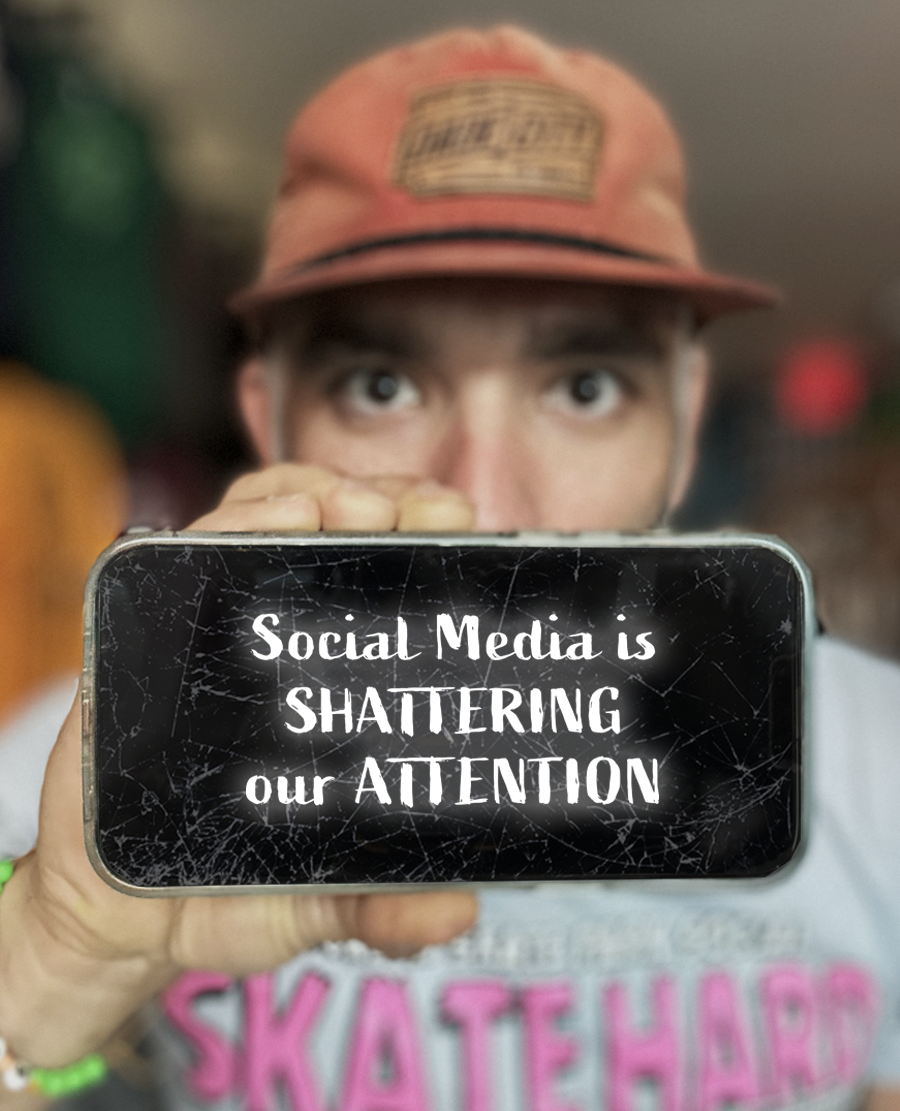You sit down at the computer to start working on a project that’s important to you, but first, you check your phone notifications. Without thinking, you bounce from app to app, checking for updates, seeing if anything catches your interest. Before you know it, 30 minutes have been consumed by mindless scrolling. When you finally snap back to it, it takes some time and effort to regain focus on the task at hand. A few moments later, just as you start to get into a groove, the cycle repeats. Sound familiar? I know it’s all too familiar to me.
Our attention is finite. We only have so much of it to our disposal. We’re limited on how much attention we’re able to use in a day. Unfortunately, we’ve slowly conditioned ourselves to severely fragment our attention span, making it next to impossible to get any focused tasks or deep work completed. We’re never able to quite “get in the zone”. If you’ve experienced this and are anything like me, there seems to be an impending feeling of guilt that soon follows. Kind of a remorse, that I just wasted all that time, attention and energy on something that didn’t in the least bit contribute to my goals. If anything, it had the opposite effect.
We are living through an attention crisis… I might even go as far as to call it an attention shortage. Both at the macro and the micro levels.
Cause and Effects of Our Fragmented Attention
Small studies of college students have found that on average, they were only able to focus on a specific task for 65 seconds at a time. 65 SECONDS! Even corporate professionals were only able to focus for 3 minutes at a time. This sounds like insanity, but if you think about you’re own attention, you might see how it’s true.
Our brains only have the capacity to produce one or two thoughts within our conscious mind at any given time. So when we’re bouncing from app to app, from text to Snapchat to Instagram to email to YouTube, etc., we’re not actually multitasking. We’re juggling. Our brains are switching our focus from one to item to the next, albeit very seamlessly, but taxing nonetheless. When we stop the task at hand to check our phone, even if for only a few seconds, your brain needs time to refocus and reconfigure. You have to remember what you were doing, how you were doing it and where you left off. This causes a significant drop in performance. It’s referred to as the “switch-cost effect”. This results in wasted brain energy and reinforces our attention shifting habit, which causes increased fragmentation and reduced ability to focus.
This can lead to high levels of stress and overwhelm.
Not being able to focus makes it next to impossible to do the things that serve us most. Things like:
- Learning
- Acquiring new skills
- Accomplishing important tasks
- Contemplating complex situations
- Finding solutions to problems
- Having meaningful conversations
- Reading (even short articles)
A study was done on 136 college students at Carnegie Mellon University. They were instructed to take a test. A group of them had to power off their phones completely, the other group was allowed to receive notifications and check them. The group who received intermittent notifications performed an average of 20% WORSE. A 20% drop in performance when our phone is allowed to be a distraction. You could see how that could really start to have a compounding effect on the quality of our work and our lives.
It’s not entirely our fault. We haven’t just given it away willy nilly, our attention has been stolen. It almost feels like a Johnny Cash song, they took it one piece at a time. So stealthily and incrementally that they were able to do it right under our noses. While we watched. By the time we look up and realize it, it’s already gone and we have to fight to salvage what’s left.
Our phones and other devices have been conditioning us to use them constantly from the time we wake up to the time we go to sleep. Most social media platforms have been designed with this in mind. They’re intended to be highly addictive in nature through the use of dopamine. The idea is to give us as much of this “happy hormone” as possible in a short period of time to keep us coming back (and staying) for more. With each notification (like, follow, etc.) comes a burst of this instant pleasure, which reinforces the brain to seek that experience.
With all of the buzzes, dings, vibes and things, it’s a struggle to reclaim a small shard of our attention.
The Good News
Although all of this can seem pretty grim, the good news is there’s hope. The effects of this phenomenon are not only correctable, the results happen more quickly than anticipated. I experienced this first hand several months ago when I decided to take a 2.5 month break from social media completely.
The first thing I noticed, despite its seemingly highly addictive nature, the urge to keep reaching for and checking my phone dissipated rather quickly. I actually started forgetting my phone places, which would RARELY happen before. Embarrassingly enough to admit, sometimes I don’t even go to the bathroom without it.
This felt different.
I didn’t feel chained to it anymore. It was a very freeing feeling. I started performing tasks uninterrupted for longer stretches of time. I was able to focus. After a while I felt like the urge to check my phone’s notification had all but vanished. For lack of better words, I felt “normal”. I felt like I had traveled back to a simpler time, a “pre-smart phone” time.
I was creating without outside influence, no worries or cares about what others thought about it. I was able to get in the zone or “flow state” much more often when working on projects that I enjoyed and that stretched my abilities. I had more mental clarity than I had in a really long time. I was actually able to hear my own thoughts, think about my own goals, my own dreams, without any outside noise.
At this point, I enjoyed the effects of my break from social media so much, that I strongly considered getting the most basic flip phone. Just talk and text. It still sounds enticing. But the more I thought about it, with my line of work and the goals I have, it’s just not practical. It’s way too powerful as a personal branding and marketing tool, but done so with high caution.
Obviously, just ditching the apps/platforms altogether would be the most effective, but I realized that for some (me included) it just may not be a practical solution. Social media can be a very useful tool when used wisely. So to combat these fragmenting effects social media and other apps have on our attention, there are a few solutions that I find very helpful. The goal here is to rebuild our capacity for focus and attention.
- Set specific time frames to "check social media" throughout the day and STICK TO THEM.
- Avoid keeping your phone within arms reach when trying focus.
- Try to perform a task (reading a book, sketching, writing, etc) for 30 minutes without reaching for your phone. Resist the cravings as they come. Be mindful and aware of how often and how intense they are.
- Get outside. Go for a run, walk, bike ride, just get moving. This is best if done alone and leave your phone at home.
- Be present where you’re at. For at least a few minutes, stare at the clouds, study the trees, people watch as they go by. Take in all the sights, feelings, sounds and smells all around you. Resist the urge to check your phone.
- Take a step back. Slow down. Give yourself a chance to actually think and feel.
- The goal here is to begin replacing low-quality leisure activities (scrolling) with high-quality leisure activities (learning a new skill, new hobby or exercising).
Regaining your attention and focus is a lot like building a muscle. Start small and slowly increase the blocks you’re able to go without feeling like you have to grab your phone and check your notifications. Over time you’ll be able to go longer and longer without checking it. The goal here is to be able to focus on a task for an extended period of time without the constant pull to reach for our phones to get that quick dopamine hit.
Our attention is being shattered and everyone seems to be fighting for a sliver. We must be diligent.
We must fight to salvage our attention…

